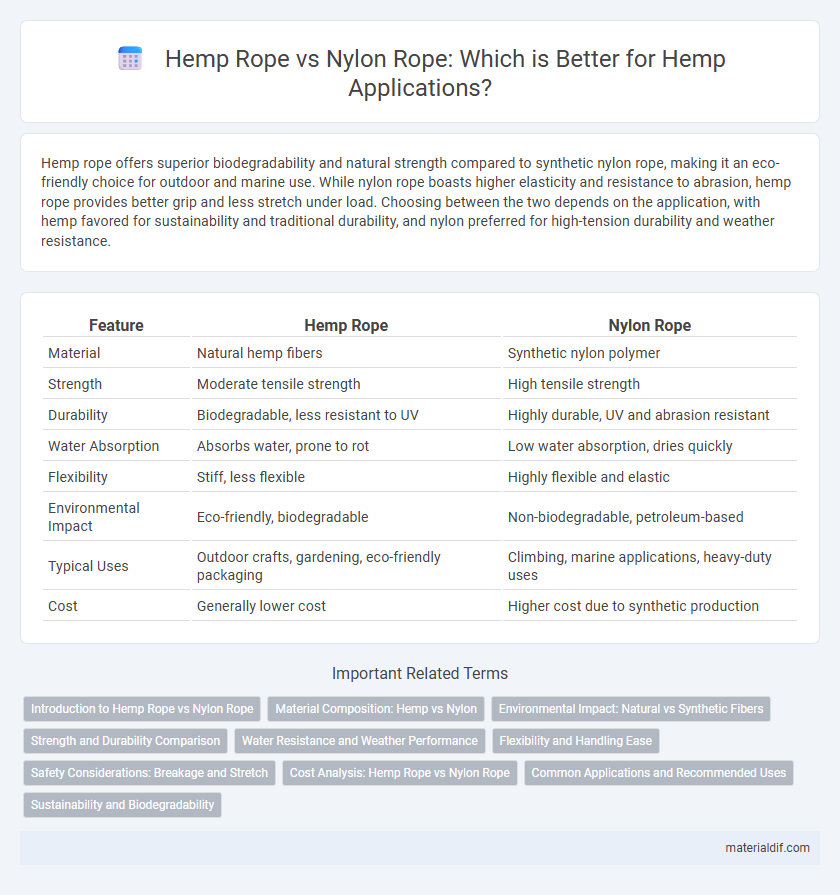Hemp rope offers superior biodegradability and natural strength compared to synthetic nylon rope, making it an eco-friendly choice for outdoor and marine use. While nylon rope boasts higher elasticity and resistance to abrasion, hemp rope provides better grip and less stretch under load. Choosing between the two depends on the application, with hemp favored for sustainability and traditional durability, and nylon preferred for high-tension durability and weather resistance.
Table of Comparison
| Feature | Hemp Rope | Nylon Rope |
|---|---|---|
| Material | Natural hemp fibers | Synthetic nylon polymer |
| Strength | Moderate tensile strength | High tensile strength |
| Durability | Biodegradable, less resistant to UV | Highly durable, UV and abrasion resistant |
| Water Absorption | Absorbs water, prone to rot | Low water absorption, dries quickly |
| Flexibility | Stiff, less flexible | Highly flexible and elastic |
| Environmental Impact | Eco-friendly, biodegradable | Non-biodegradable, petroleum-based |
| Typical Uses | Outdoor crafts, gardening, eco-friendly packaging | Climbing, marine applications, heavy-duty uses |
| Cost | Generally lower cost | Higher cost due to synthetic production |
Introduction to Hemp Rope vs Nylon Rope
Hemp rope, made from natural fibers derived from the Cannabis sativa plant, offers superior biodegradability and environmental sustainability compared to synthetic nylon rope. While nylon rope provides high tensile strength and resistance to abrasion, hemp rope excels in breathability and natural grip, making it ideal for eco-friendly applications. Understanding the differences in material composition and performance characteristics helps in selecting the appropriate rope type for specific uses such as marine, agricultural, or craft purposes.
Material Composition: Hemp vs Nylon
Hemp rope is made from natural fibers derived from the stalks of the Cannabis sativa plant, offering biodegradability and resistance to UV degradation, making it environmentally friendly and sustainable. Nylon rope consists of synthetic polyamide fibers known for their high tensile strength, elasticity, and resistance to abrasion and chemicals, providing superior durability in demanding applications. The material composition directly influences performance characteristics, with hemp excelling in eco-friendly contexts and nylon preferred for heavy-duty, high-stress environments.
Environmental Impact: Natural vs Synthetic Fibers
Hemp rope offers a significantly lower environmental impact compared to nylon rope due to its natural, biodegradable fibers that reduce landfill waste and pollution. The cultivation of hemp requires fewer pesticides and less water than the production of synthetic nylon, which relies on petroleum-based resources and energy-intensive manufacturing processes. Choosing hemp rope supports sustainable agriculture and minimizes plastic pollution in marine and terrestrial ecosystems.
Strength and Durability Comparison
Hemp rope offers natural strength with high tensile properties and excellent resistance to UV light, making it durable for outdoor use. Nylon rope surpasses hemp in overall tensile strength and elasticity, providing superior shock absorption and resistance to abrasion. While nylon resists rot and mildew better than hemp, its synthetic nature can degrade under prolonged UV exposure, impacting long-term durability.
Water Resistance and Weather Performance
Hemp rope naturally absorbs water, leading to swelling and reduced tensile strength over time, while nylon rope exhibits superior water resistance, maintaining durability and flexibility even when wet. Nylon's synthetic fibers resist UV degradation and mildew, making it ideal for prolonged outdoor use in harsh weather conditions. Hemp rope, though biodegradable and environmentally friendly, requires more maintenance to prevent rot and deterioration in damp environments.
Flexibility and Handling Ease
Hemp rope offers superior flexibility and a natural grip, making it easier to handle for tasks requiring precision and comfort. Nylon rope, while strong and durable, tends to be stiffer and can become slippery when wet, reducing handling ease. The organic texture of hemp rope provides better tactile feedback, enhancing control during use.
Safety Considerations: Breakage and Stretch
Hemp rope offers superior safety with low stretch and predictable breakage points, reducing sudden snapping risks during heavy loads or dynamic activities. Nylon rope stretches significantly under tension, which can absorb shock but may lead to unexpected elongation and potential loss of control, posing hazards in critical safety applications. Choosing hemp rope enhances reliability in situations where consistent strength and minimal elongation are vital for preventing accidents and injury.
Cost Analysis: Hemp Rope vs Nylon Rope
Hemp rope typically costs more upfront due to its natural fiber sourcing and labor-intensive production, while nylon rope offers lower initial prices due to synthetic manufacturing processes. Over time, nylon rope's durability and resistance to moisture reduce replacement frequency, potentially lowering long-term expenses compared to hemp rope's susceptibility to rot and UV degradation. Maintenance costs for hemp rope are higher, requiring regular treatment to prevent wear, influencing the overall cost-effectiveness in various applications.
Common Applications and Recommended Uses
Hemp rope is commonly used in maritime, gardening, and decorative applications due to its natural strength, biodegradability, and resistance to UV damage, making it ideal for eco-friendly projects and outdoor use. Nylon rope excels in climbing, rescue operations, and heavy-duty industrial purposes because of its superior elasticity, high tensile strength, and excellent resistance to abrasion and chemicals. Choosing between hemp and nylon ropes depends on environmental impact considerations, load requirements, and specific use cases like sustainability versus durability under strain.
Sustainability and Biodegradability
Hemp rope is a sustainable option made from natural fibers that biodegrade quickly, reducing environmental impact and landfill waste compared to nylon rope, which is derived from petrochemicals and can take decades to decompose. The cultivation of hemp requires fewer pesticides and less water than synthetic fiber production, enhancing its eco-friendly profile. Hemp rope's strength and durability combined with its renewable nature make it a preferred choice for environmentally conscious consumers.
hemp rope vs nylon rope Infographic

 materialdif.com
materialdif.com